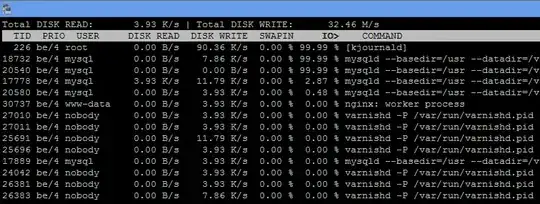I have problems with high I/O on my Debian 7.3 server (up to 7 seconds average I/O wait). I tried to find out what's causing this by using iotop -o. Now I see sonething strange: iotop tells me on the top 'Total DISK WRITE: 32.46M/s'. But in the tasklist I can't see any process writing so much on the disk. The highest are two mysql-processes with 90K/s and 8K/s and a kjournald Process. All three are listed with 99,99% IO. # If I add all the writing speed I come nowhere near to 32MB/s.
Screen of iotop:

What's wrong here? I think 32.46MB/s writing is correct, because at this time my webserver has a high page load time, probably caused of high I/O. But why are the 'big task' which use this much capacity, is not listed in the list below?
Edit: I can also sort it by disk write and i also get strange results like this:
